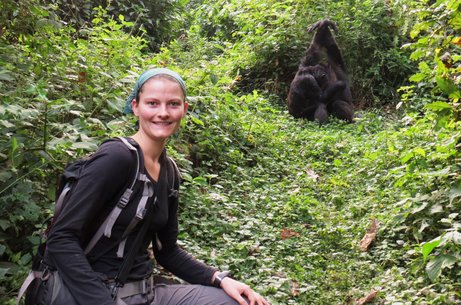
Chimpanzee aggression is not the result of interaction with humans and is something they naturally do, according to a new study co-authored by a former Gates Cambridge Scholar.
Chimpanzee aggression is not the result of interaction with humans and is something they naturally do, according to a new study co-authored by a former Gates Cambridge Scholar.
The new study looks at decades of data from chimpanzees and their close relatives, bonobos (also called pygmy chimpanzees) and contradicts the theory which has emerged since the 1970s when Jane Goodall’s reports of chimpanzee violence caught the attention of a global audience that chimpanzees kill because their behaviour has been changed by human activities, such as researchers feeding chimpanzees, or the destruction of habitat as people clear forest for farms.
Researchers Kathelijne Koops [2006], a former Gates Cambridge Scholar from the University of Cambridge, and Chie Hashimoto from Kyoto University contributed findings from the chimpanzee study site in the Kalinzu Forest, Uganda, to an Africa-wide study of 22 sites and 30 co-authors published online in Nature TBD. Overall, the study compiled over five decades’ information from 18 chimpanzee (Pan troglodytes) communities and four bonobo (Pan paniscus) communities.
“Chimpanzees and bonobos are the two living species most closely related to us of all the animals alive today; we have most in common in terms of genetics and evolutionary history,” says University of Minnesota lead author Michael L. Wilson. “Based on our results, it’s clear that lethal aggression is something that chimpanzees naturally do. We found that chimpanzees sometimes kill other chimpanzees, regardless of whether human impacts are high or low, whereas bonobos were not observed to kill, whatever the level of human impacts.”
“By studying our closest living relatives we are able to shed light on the evolutionary origins of behaviours such as technology, language, as well as violence and warfare,’’ Koops said. While the new study answers one question, many more remain. Wilson says: “It’s still an open question whether this sort of violence is something which has happened continuously in human evolutionary history, or whether it arose independently in humans and chimpanzees. Perhaps our common ancestor, which we believe lived five to seven million years ago, also had high rates of violence.”
The study began as a response to a growing number of commentators claiming that chimpanzee violence was caused by human impacts. “This is an important question to get right. If we are using chimpanzees as a model for understanding human violence, we need to know what really causes chimpanzees to be violent,” says Wilson. Koops adds: “When studying wild chimpanzees, it is quite rare to observe a killing event and as a result it is difficult to draw firm conclusions based on the research conducted at only one site. Our study combines long-term data from all the major chimpanzee and bonobo study sites and therefore allows us to address key questions regarding the evolutionary origins of lethal aggression.’’












